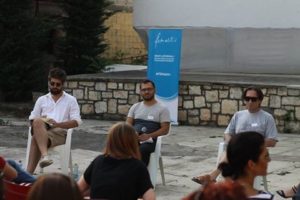Neaht Sadiku from Mitrovica, who says that he is a feminist, says that the lack of freedom, lack of space and lack of possibilities for women in Kosovo pushed him to support feminism.
This young Kosovar, who is a civil society activist, says he wants to make sure he will be one of those who will set an example for gender equality, and will not allow new inequalities to be created.
“I always put stress on freedom, space and opportunity since I have noticed that women are not free to be who they want to be. She has no opportunity to be who she wants to be, and even if she becomes that, she cannot prove herself. I am afraid of that, and it is a fact that feminism is transforming into the opposite of machoism. It is turning into hate against men. It often happens that instead of feminism, the ‘feminists’ themselves cultivate sexism, often against themselves, and here we cannot talk about feminism,” he says.
Sadiku says that he always supported women and that in several rallies at school and through social networks, he tried to contribute to the awareness of women and the society in general.
A rally similar to those he mentioned was held in July in Prizren, in which an informal group of women and girls from Prizren “FEMaktiv,” organized the feminist debates week.
According to Tringa Kasemi, a “FEMaktiv” activist, there are not enough debates regarding feminism in Kosovo, despite the great need for them.
“Such topics are given a small importance. This was one of the reasons for holding feminist debates with citizens, to purposely discuss feminism and for all of us embrace it. We should see it as an open topic for discussion and clearly understand the core and the meaning of feminism in the right way,” she says.
Kasemi admits that there are feminist men in Kosovo who contribute in this field and are very close to the idea of creating gender equality in our society.
“The citizens have actually expressed a high interest in discussing the topic of feminism, seeing this topic as something important in their life. They expressed their ideas, such as how can feminism be included in our daily conversations and have its own importance, and also they discussed the importance of discussing this topic in every place,” she emphasizes.
As one of the activists, Nehat Salihu, explains that he has had prejudices and confrontations with the others regarding this issue.
“I have to say that lack of information, unfortunately, is the cause on almost each occasion. There are numerous cases when I confronted men to support women and their rights. I can say that we are on the right track to achieve equality and for women to get everything they deserve, since the opponents of feminism have no arguments to oppose our requirements for the society to fulfill obligations it has toward women,” he emphasizes.
The Constitution of the Republic of Kosovo defines the legal basis for introducing and regulating the basic principles of gender equality in Kosovo and determines gender equality as a basic constitutional right. According to the first article of the Constitution, the government should guarantee equality among men and women and develop policies for equal opportunities. The Constitution also prohibits discrimination, including gender-based discrimination.
Besa Shahini, the director of the “Education Plenum” organization, said in a discussion panel in KosovaLive that our society needs to develop authentic feminism.
“Patriarchalism in Kosovo is specific and we feel it under our skin, we who live in town and women who live in villages. It is instilled everywhere and not only in men, but in women also, and we need a kind of feminism that can be sustained no matter the impediments. If a group of women protest on the 8th of March, they will not achieve their goals and will not be able to shake the whole existing system,” she said.
According to the feminism activist Rreze Abullahu, women in Kosovo are not treated as they should.
“If someone thinks that women are exaggerating, that they have never been treated better than nowadays, I suggest they put the finger on their head and think. Wow, were they served in the morning, who served them tea, how they pushed their daughters to get married and felt relieved from them, as if they got a problem out of their life! How they taught their daughters how one should handle husbands and that they always have the right to yell at them. They should think how they taught their daughters to shut their mouth, since none is going to stand them if they keep talking, and numerous nonsense that brought us to the current situation: ‘Fearing if tomorrow I will be the victim’,” she emphasizes.
In a 2014 report of the Agency for Gender Equality regarding the participation, the role and the position of women in local and central institutions and in political parties, is said that female participation in the overall number of the employees in the ministries was 42%, whereas in the administration of the municipality the number was 27%. Female participation in leading positions was 27% in ministries and 19% in municipalities, whereas a lower representation of women was noticed in decision-making positions: 7% in ministries and 4% in municipalities.
The division of the inheritance remains the weakest point for Kosovar women. According to Kosovar Agency of Statistics (KAS), during the 2014-2015 period, only 5% of the women in Kosovo owned houses or apartments, whereas 4.9% out of them owned agricultural land.
Arbresha Berisha






